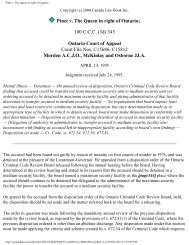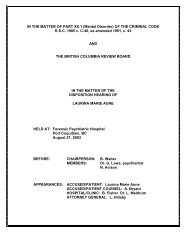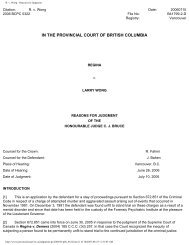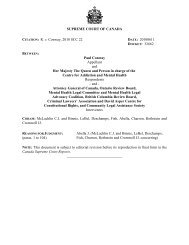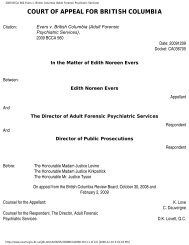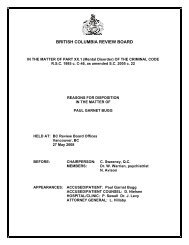R. v. Cuerrier - British Columbia Review Board
R. v. Cuerrier - British Columbia Review Board
R. v. Cuerrier - British Columbia Review Board
You also want an ePaper? Increase the reach of your titles
YUMPU automatically turns print PDFs into web optimized ePapers that Google loves.
R. v. <strong>Cuerrier</strong><br />
122 The Clarence decision rejected the broad approach to fraud set out in Bennett and<br />
Sinclair. There the court held that non-disclosure of a venereal infection was not related to the nature of<br />
the act of sexual intercourse and therefore the fraud did not vitiate the consent. For the reasons set out<br />
earlier neither the reasoning or conclusion reached in Clarence are acceptable.<br />
123 The deadly consequences that non-disclosure of the risk of HIV infection can have on an<br />
unknowing victim, make it imperative that as a policy the broader view of fraud vitiating consent<br />
advocated in the pre-Clarence cases and in the U.S. decisions should be adopted. Neither can it be<br />
forgotten that the Criminal Code has been evolving to reflect society's attitude towards the true nature of<br />
the consent. The marital rape exemption was repealed in Canada in 1983. The defence of mistaken belief<br />
in consent was narrowed in the 1992 amendments. Section 273.2(b) eliminated consent as a defence to<br />
sexual assault in situations where the accused did not take reasonable steps to ascertain that the<br />
complainant was consenting.<br />
124 In my view, it should now be taken that for the accused to conceal or fail to disclose that he is<br />
HIV-positive can constitute fraud which may vitiate consent to sexual intercourse.<br />
D. Will There Be a Valid Consent in the Absence of Disclosure?<br />
125 Persons knowing that they are HIV-positive who engage in sexual intercourse without advising<br />
their partner of the disease may be found to fulfil the traditional requirements for fraud namely<br />
dishonesty and deprivation. That fraud may vitiate a partner's consent to engage in sexual intercourse.<br />
126 The first requirement of fraud is proof of dishonesty. In light of the provisions of s. 265, the<br />
dishonest action or behaviour must be related to the obtaining of consent to engage in sexual intercourse,<br />
in this case unprotected intercourse. The actions of the accused must be assessed objectively to<br />
determine whether a reasonable person would find them to be dishonest. The dishonest act consists of<br />
either deliberate deceit respecting HIV status or non-disclosure of that status. It cannot be forgotten that<br />
the act of intercourse is usually far more than the mere manifestation of the drive to reproduce. It can be<br />
the culminating demonstration of love, admiration and respect. It is the most intimate of physical<br />
relations and what actions and reactions led to mutual consent to undertake it will in retrospect be<br />
complex. It would be pointless to speculate whether consent would more readily follow deliberate<br />
falsehoods than failure to disclose. The possible consequence of engaging in unprotected intercourse<br />
with an HIV-positive partner is death. In these circumstances there can be no basis for distinguishing<br />
between lies and a deliberate failure to disclose.<br />
127 Without disclosure of HIV status there cannot be a true consent. The consent cannot simply be<br />
to have sexual intercourse. Rather it must be consent to have intercourse with a partner who is HIVpositive.<br />
True consent cannot be given if there has not been a disclosure by the accused of his HIVpositive<br />
status. A consent that is not based upon knowledge of the significant relevant factors is not a<br />
valid consent. The extent of the duty to disclose will increase with the risks attendant upon the act of<br />
http://ql.quicklaw.com/qltemp/C2KEwCMAFbZMTYcs/00011scr-00019415%2ehtm (38 of 44)2007-08-21 1:18:15 PM


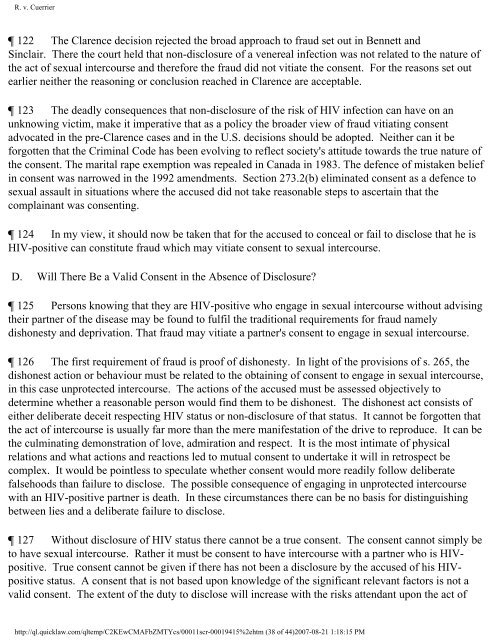
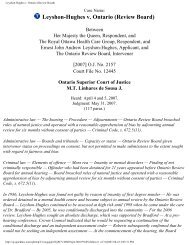
![LaFortune [LaFortunate] (Re) - British Columbia Review Board](https://img.yumpu.com/42779845/1/190x245/lafortune-lafortunate-re-british-columbia-review-board.jpg?quality=85)
